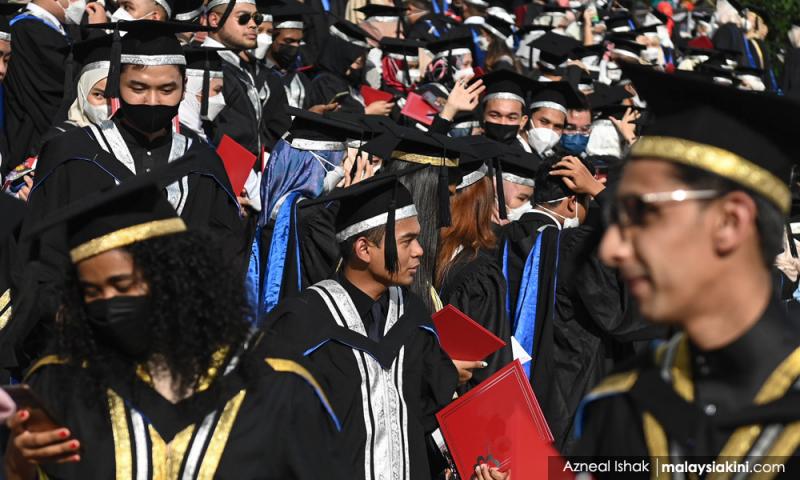LETTER | Gerak deeply concerned with tertiary hybrid learning plans
LETTER | Gerak is deeply concerned with recent reports of Higher Education Minister Mohamed Khaled Nordin’s intention to introduce hybrid and flexible learning systems and reduce the duration of selected programmes in our public universities, beginning with nine such universities.
We are troubled because the proposals are not the kind of interventions that should be forced down upon universities without a considerable study of their impact on the institutions and the way education is now provided in them.
The minister has not provided any evidence of prior discussion or consultation on these matters either with the universities or the regulatory bodies embedded in the National Higher Education System, such as the National Council on Higher Education (NCHE) or the Malaysian Qualifications Agency (MQA).
We are troubled, we regret to say, that - not for the first time - these systemic structures that have been created by legislation to regulate higher education are given scant attention.
Important decisions on higher education indeed continue to be foisted on universities and other institutions without their or other stakeholders’ views being solicited.
It is ironic that in a system that requires curricula to be developed through consultation with students and other stakeholders such as employers and related industries, fundamental changes to the way education is delivered are handed down for implementation without any measures to establish their relevance or suitability.
Additionally, it is also important to point out that such impositions on universities and the way they are imposed would affect them not only procedurally but also psychologically.
Our universities already have senates who have been entrusted with looking into, discussing and debating, and autonomously deciding on these matters.
Taking away their authority on matters that are core to them belittles the people who are appointed to manage them by reducing them to becoming compliant automatons.
Ministerial actions must not impede but promote the development of a corps of intellectuals to educate our students and build the nation’s knowledge capital.
Hybrid and flexible learning strategies have been part of the higher education landscape for more than three decades.
These concepts are part of a pedagogical evolution that has seen significant advancements, incorporating various instructional strategies and technologies to enhance the learning experience.
Whilst these strategies may, on the face of it, appear alluring, there is a whole host of issues that must be considered before considering their implementation.
Hybrid and other technology-based learning present at least three sets of issues that must be thoroughly reviewed.
These are the cost of the technology, the student-teacher relationship, and the university’s authority over the education it provides.
These issues will play out differently in rich nations and in poor nations, in autocratic states and those that value education as a driving force of civilisation.
The temptation to outsource the technology will be strong.
What it would evolve to is a single set of learning programmes that are built into a proprietary system with a centrally administered assessment mode.
This would all but completely initiate the demise of the university and complete the commercialisation of higher education.
But that is not all.
The problem with technology-based solutions is that they will always lag behind technology, especially when the technology involved is growing at an exponential rate.
Hybrid learning must not be allowed to lead higher education into the McDonald's model of production. Universities must retain control over education and apply the best technology as a servant to its needs.
In fact, the technology that drove hybrid learning is already old hat with the advent of artificial intelligence-driven tools. Indeed, the Hybrid model that the minister has in mind is probably already outdated.
The new concepts tend to minimise the importance of the teacher-student relationship in higher education. Whole tomes can be written on this subject and its particular importance in the educational environment of a country such as ours.
However, we will only state here that these new concepts must not be seen as manpower solutions to reduce staff complements of universities.
Instead, there must be a reimagining of that vital relationship. Any decrease in contact hours in the lecture rooms through the new models must see an increase in student-staff engagements in other forms.
We have already stated the importance of universities in a country such as ours. New concepts such as those being proposed must only be introduced to meet the individual needs of universities.
The temptation to create a centrally based knowledge system must be avoided. The pursuit of knowledge and truth, which are tasks of intellectual effort, must not be replaced by a system that switches on information to meet curricular needs.
These points that we have raised are not meant to be a comprehensive coverage of the issues involved but to emphasise the need for a more studied approach to the implementation of the new concepts.
Moving students from a face-to-face educational form to a stay-at-home learning system must be preceded by an interim when both students and teachers are educated on the new methods.
To reiterate, peremptory directions must give way to a more consultative approach that involves consultation with stakeholders and other regulators such as the National Council for Higher Education and the Malaysian Qualifications Agency.
The long-term needs of students and the nation must not be sacrificed for expedience or the introduction of new concepts without adequate research on their consequences.
The views expressed here are those of the author/contributor and do not necessarily represent the views of Malaysiakini.
RM12.50 / month
- Unlimited access to award-winning journalism
- Comment and share your opinions on all our articles
- Gift interesting stories to your friends
- Tax deductable
